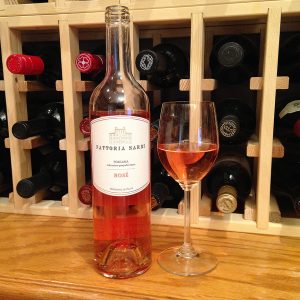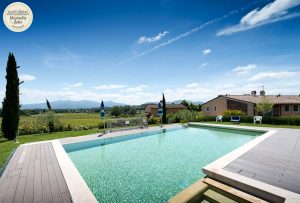Bright, light pink color; watermelon, raspberry, roses on the nose; very nice and big fruit, melon, strawberry, some cherry on the palate.
Dry with faint whisper of sweetness buoyed by the big fruitiness; medium body, excellent mouthfeel, good acidity, balanced; depth and persistence on the finish. Blend of sangiovese, merlot, ciliegiolo (an Italian red grape—the word means “cherry”—and likely a relative of sangiovese), and small amount of other grapes. The wine lays on the lees for four months to add depth and complexity.
This is the rosé style for you if you are turned off by vapid, tarted-up-with-sugar rosé unfortunately inflicted upon you by people who did not have your best interest at heart, but you also are not charmed by bone-dry rosé that may play well with food but is too austere for your palate. Very smooth and easy drinking. Just plain delicious, which always is my highest praise for wine. Also another example of rosé that can be enjoyed all year long, not just as a summertime sipper.
The wine comes from Colline Lucchesi, a small zone in Italy just north of Pisa; Lucca is the principal town. Lucca is the birthplace of Giacomo Puccini (La Bohème and Madama Butterfly). There are only 10 wine producers in the region, and Fattoria Sardi Giustiniani is the largest. The vineyard is certified organic by ICEA (Environmental and Ethical Certification Institute), the Italian consortium that controls and certifies companies that carry out activities that respect people and nature—they score on how workers are treated, not just bugs and plants. ICEA prides itself in certifying organic practices from “farm to fork”, not just in the farming/vineyard operations. $19
Second photo: Fattoria Sardi Giustiniani vineyard and “wine resort.”


